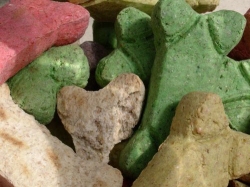How you can feed puppies
Buy your puppy the best high quality food you can find as this is critical to your pet's healthy development. The label should include the words "nutritionally complete and balanced."
Some individuals feed their dogs exclusively dry food while other people opt for wet food only or feed a mix of dry and wet. If you choose dry food it may be essential to soften it with a bit of canned food in his initial couple of months as puppies sometimes have a challenging time chewing it. As a general rule of thumb, in the event you can really feel your puppy's ribs but can't see them, he is likely a healthy weight for his size.
When feeding, remove any uneaten food right after 20 minutes. Be particularly careful about this during the summer months as food left out can attract bugs. It is also important that your puppy stays hydrated, so usually make certain there's plenty of fresh water in his bowl.
A easy method to tell if the food your puppy is eating is compatible with his program would be to observe his bowel habits. Big, formed dark stools are what you should see. Diarrhea can indicate that your puppy isn't digesting nicely and might be sensitive or allergic to one or more of the ingredients. In the event you suspect this, eliminate the possible offender for one month then reintroduce to see if your puppy reacts.
see. Diarrhea can indicate that your puppy isn't digesting nicely and might be sensitive or allergic to one or more of the ingredients. In the event you suspect this, eliminate the possible offender for one month then reintroduce to see if your puppy reacts.
Although the temptation can be challenging to resist, attempt to steer clear of feeding table scraps- they're a source of additional fat and calories that will effortlessly get out of hand and cause your puppy to gain weight too quickly. Overfeeding may also cause canine bloat- a condition that distends a puppy's belly and may require emergency treatment. Puppy treats produced exclusively for puppies are a great method to reinforce great behavior in your puppy but should not make up more than 15% of his total caloric intake. Never give a puppy or dog chocolate- it's toxic and potentially fatal.
Take good care of your puppy's food and dietary habits and you will lay a strong foundation for taking good care of your puppy.





Comments